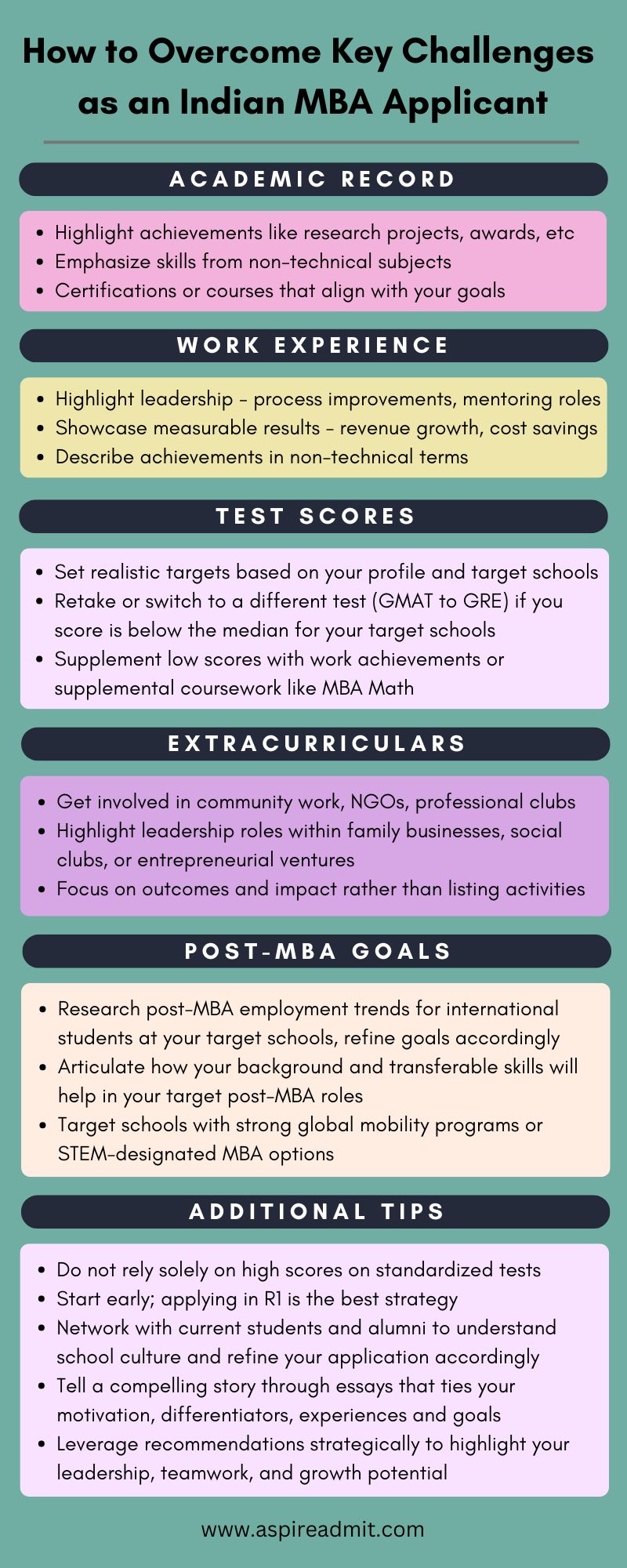How to Overcome Key Challenges as an Indian MBA Applicant?
Applying to top MBA programs can be a daunting process, especially for Indian applicants who face a unique set of challenges like intense competition from Indian peers to identifying differentiating factors to make their application stand out. In this blog post, I will guide you through the profile evaluation process and give you actionable strategies on how to overcome key challenges as an Indian MBA applicant.
Understanding How AdComs Assess Your Profile
Admissions committees evaluate MBA applications holistically, typically considering the following five factors:
- Academic Background
- Work Experience
- Test Scores (GMAT/GRE/EA)
- Extracurricular Activities and Leadership
- Post-MBA Goals and Fit
Let’s break down each of these factors and discuss specific challenges faced by Indian applicants.
1. Academic Background
Adcoms value academic excellence as they consider it as an indicator of an applicant’s success in the MBA program. Indian applicants often have good academic performance with high undergraduate GPAs. Most graduate from reputed colleges like IITs, and NITs. However, Indian applicants frequently come from technical fields like engineering, making it harder to stand out.
Key Challenges:
- Overrepresentation from engineering and IT backgrounds.
- Lack of diversity in academic disciplines among Indian applicants.
Strategies to Overcome This:
- Highlight academic achievements beyond GPA (e.g., research projects, academic awards).
- Emphasize skills from non-technical subjects if applicable.
- Consider certifications such as CFA, CPA, or specialized courses that align with your goals.
2. Work Experience
Adcoms look for strong professional achievements, leadership potential, and career progression. Indian applicants often face hurdles in showcasing impactful leadership roles given that their roles are mostly technical and Indian companies are generally hierarchical.
Key Challenges:
- Heavy representation from IT services, and engineering roles.
- Difficulty in demonstrating leadership in rigid corporate structures.
Strategies to Overcome This:
- Highlight initiatives you led, such as process improvements, mentoring roles, or client-facing responsibilities.
- Showcase measurable results (e.g., revenue growth, cost savings, or project impact).
- Use clear, concise language to describe achievements in non-technical terms for broader appeal.
Learn More About Top MBA Programs
3. Test Scores (GMAT/GRE/EA)
Indians tend to perform well on standardized tests like GMAT, GRE and EA. Hence, having a competitive test score is critical for Indian applicants due to the volume of strong candidates in the pool.
Key Challenges:
- Higher GMAT score expectations for Indian applicants, especially from engineering backgrounds.
- Balancing preparation with demanding professional commitments.
Strategies to Overcome This:
- Set realistic GMAT/GRE/EA score targets based on your profile and target schools.
- Consider retaking the test or switching to a different test (e.g., taking GRE instead of GMAT) if your score is below the median for your preferred schools. Read this article to understand how to choose between GRE and GMAT.
- Showcase quantitative skills through work achievements or supplemental coursework like MBA Math if your test scores are low. Read this article to learn how you can build a strong application with low test scores.
4. Extracurricular Activities and Leadership
Top MBA programs value applicants who demonstrate leadership outside of work. Unfortunately, given the emphasis on academics in most undergraduate colleges, Indian applicants sometimes struggle to highlight meaningful extracurricular involvement.
Key Challenges:
- Limited involvement in community service or leadership roles beyond the workplace.
- Focus on technical skills rather than holistic leadership development.
Strategies to Overcome This:
- Get involved in community work, non-profits, or professional networks.
- Highlight leadership roles within family businesses, social clubs, or entrepreneurial ventures.
- Focus on outcomes and impact rather than merely listing activities.
5. Post-MBA Goals and Fit
Adcoms prefer candidates who have a clear vision for their future. It is essential to articulate your post-MBA goals well and make sure they align with your target school’s strengths. Indian applicants often face unique challenges in this area due to visa restrictions, job market dynamics, and career mobility concerns.
Key Challenges:
- Aligning post-MBA goals with realistic employment opportunities in competitive global markets.
- Navigating visa restrictions, especially for those targeting jobs in the US, UK, or Europe.
- Justifying a career switch effectively, particularly for those moving from IT/engineering to finance or consulting.
Strategies to Overcome This:
- Conduct thorough research on post-MBA employment trends for international students at your target schools.
- Connect with alumni to understand the job market and refine realistic short-term and long-term goals.
- Clearly articulate how your background and transferable skills will help you succeed in your chosen post-MBA career.
- Consider targeting schools with strong global mobility programs or those that offer STEM-designated MBA options to maximize work visa flexibility.
Get Your Profile Evaluated
Common Mistakes Indian Applicants Should Avoid
- Relying Solely on High Scores: While good test scores are essential, they alone do not determine your chances of a call back as adcoms evaluate profiles holistically.
- Undervaluing Soft Skills: Emphasizing teamwork, communication, and adaptability is critical.
- Overloading Essays with Technical Jargon: Avoid overly technical language; focus on impact, leadership, collaborative skills and problem-solving.
- Not Focusing on Networking: Connecting with current students, alumni, and admissions representatives can improve your understanding of a school’s culture and help you prepare a more suitable application.
Additional Tips for Indian Applicants
- Start Early: Indian applicants face intense competition, so giving yourself ample time to refine your application is crucial.
- Tell a Compelling Story: Focus on crafting a strong personal narrative that ties together your experiences, achievements, and goals.
- Leverage Recommendations Strategically: Choose recommenders who can highlight your leadership, teamwork, and growth potential.

Indians are one of the most over represented applicant pools to top MBA programs across the world. It is essential to differentiate your profile with strategic planning and thoughtful storytelling. By addressing key challenges that you might face and focusing on what makes you unique, you can significantly improve your MBA application and increase your chances of success.
